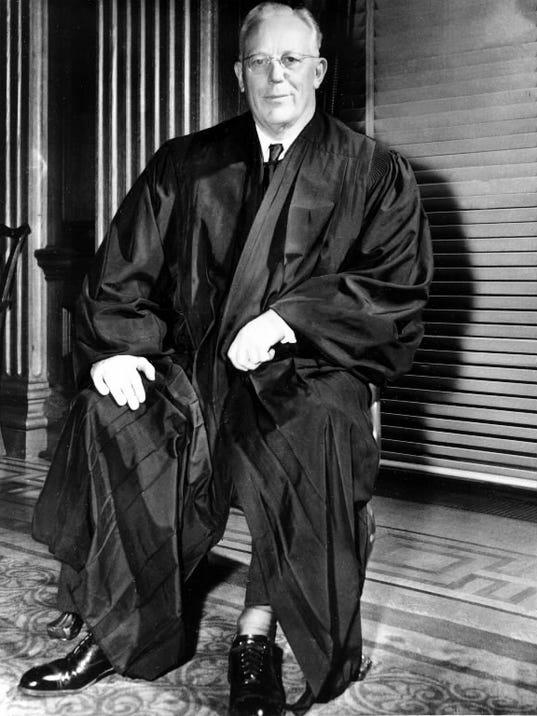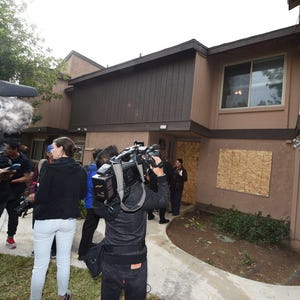2011 (1)
2016 (1035)
2017 (752)
2018 (978)
2019 (385)
2020 (175)
2021 (235)
2022 (101)
2023 (983)
2024 (800)

George Takel: The Man Behind My Internment
已有 188 次閱讀2015-12-21 19:49|個人分類:感言社會|係統分類:海外觀察|關鍵詞:Internment 推薦到群組
Chief Justice Earl Warren
Donald Trump’s call for a ban on all Muslims entering this country, and his invocation of President Franklin Roosevelt’s internment of Japanese Americans in the wake of Pearl Harbor, has been debated and scrutinized by politicians, pundits, legal scholars and the news media — not to mention world leaders and average citizens.
Many are shocked by his words, but I am not among them. Sadly, I have seen this before, when a rising political star traded heavily in the currency of fear to fuel his political machinery. Back then, that man was not a right-wing conservative like Trump; he was Earl Warren, who later became chief justice of the U.S. Supreme Court, where he was beloved by liberals as a progressive force for racial desegregation.
Warren was not always so enlightened. In 1941, as California's attorney general, Warren had his sights squarely on the governorship. Anti-Japanese sentiment was running high, and Warren encouraged the mob. He leveraged a widely held notion that all of us, even citizens born here, had a natural, racial predisposition toward Japan. Given the opportunity, he warned, we would do harm to America. He played upon ignorance of our culture and fear of our “otherness,” claiming it was our “method of living” that rendered any distinctions among us impossible.
What followed was a nightmare, exceedingly so immediately after the Pearl Harbor attack on Dec. 7, 1941. Overnight, my family and 120,000 others of Japanese descentbecame the enemy, simply because we looked like those who had attacked us.
The authorities came for our community leaders, many of whom simply disappeared. The noose tightened when the government imposed curfews, restricted our travel, then froze our bank accounts. On Feb. 19, 1942, President Roosevelt issued an order authorizing our “evacuation” from the West Coast. I remember when soldiers with bayonets came marching up our driveway to order us out, my mother crying as she held my baby sister. We were permitted only what we could carry; our homes and businesses were abandoned or sold for pittances. They sent us first to a racetrack to live for weeks in a horse stable before being shipped away to an internment camp in the swamps of Arkansas. We spent four long years behind barbed wire fences, without charge or trial, all for the crime of being Japanese.
Trump’s proposals have included entry bans and databases of Muslims, and herecently stated that he might even have supported the internment during World War II. Like him, Warren harnessed the true power of fear. In a masterful stroke, Warrenacknowledged that there were no reported acts of espionage or sabotage by our community, but he argued this was compelling evidence of some unknown, massive and coordinated activity yet to come. Warren also testified that our lands were located near power lines, railroads, military bases and oil fields — implying a vast conspiracy. He intoned that "the Japanese population of California is, as a whole, ideally suited … to carry into execution a tremendous program of sabotage on a mass scale." No one pointed out that these lands were once barren, deserted plots transformed into productive farms after decades of toil. Warren went on tobecome governor, buoyed in part by his anti-Japanese platform.
It does not take much to single out any group and stoke irrational fears. A farmhouse, or a mosque, quickly can become a dreaded symbol of terror yet to come. But this is the power of fear: It works so effectively because it feeds off not just what is known, but what is unknown yet presumed. Fear can gain this hold, even if all the evidence in the world is stacked against it.
Trump’s arguments today echo Warren’s election gambit in 1942. Citing dubious polls,Trump warns that there is “great hatred towards Americans by large segments of the Muslim population,” and that uncertainty requires strong, indiscriminate measures. “Until we are able to determine and understand this problem and the dangerous threat it poses,” Trump argues, “our country cannot be the victims of horrendous attacks by people that believe only in jihad.” Trump thus resurrects FDR’s wartime justification for internment: Because we cannot know whom to suspect, better that we suspect them all.
http://blog.sciencenet.cn/blog-2374-945077.html 此文來自科學網王飛躍博客,轉載請注明出處。
上一篇:一本書的力量:與黃琳老師的交往與相關回憶





